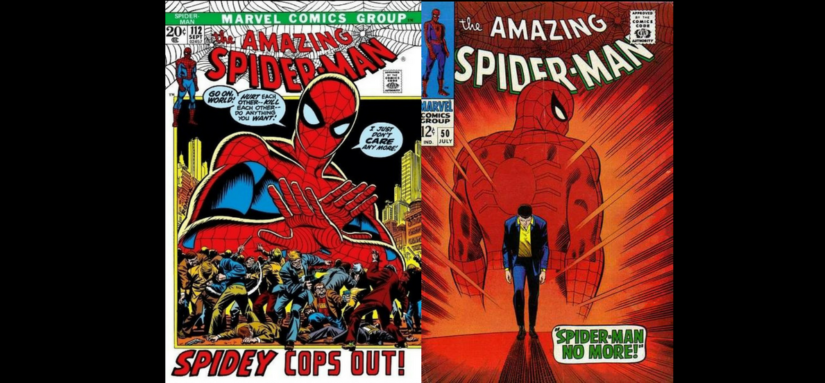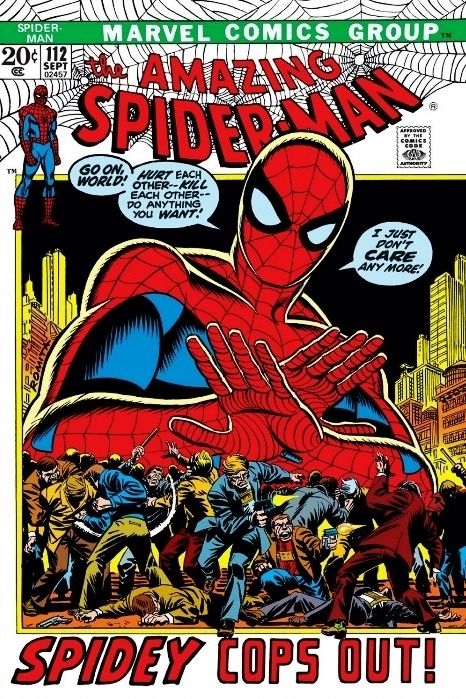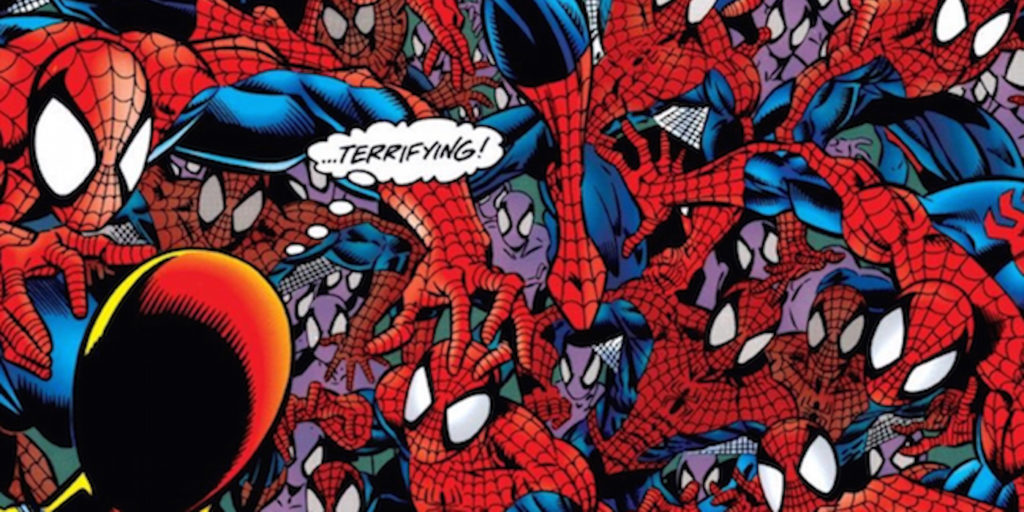“All the old heroes are like children to you now/
As you go to burn their shame away/
Without knowing exactly how” — “All the Old Heroes” by Joseph Arthur from the album The Ballad of Boogie Christ
I loved Spider-Man. He was one of the first characters I clung to as a kid. Besides Superman and Batman, when it came to getting my superhero fix, I was one of those “Make Mine Marvel” guys from day one.
So much about Spidey appealed to me. If you’re reading this, you don’t need me to tell you about his origin story, and his reason for donning the costume and fighting crime. With great power comes great responsibility, and that guilt, that weight of regret that Peter Parker has been carrying around on his shoulders all these years, still resonates with me right down to my very core. As a reader, when I can identify with a character so strongly, like Peter Parker, the man behind the webbed mask, well, you might as well sign me up for a lifetime subscription, because you’re not printing comic books. No, that there is a license to print money.
My “spidey-sense” is tingling right now, and it’s telling me I’m not the only one out there who cheered on the webhead.
When I was a child, Batman was intriguing, but how could I relate to a multimillionaire fighting crime to avenge the murder of his parents?
Superman? Superman had it all. As an adult, I have a greater appreciation for the character with the cape and the iconic bold letter “S” emblazoned on his chest. I admit there were nuances to Superman that flew right over my head in grade school. When I was six, seven, eight years old, and growing up in the eighties with a nation led by a president who was benchpressing Reaganomics, waging a war on drugs, and tearing down walls? Superman was Hulk Hogan without the prescription strength supplements. He was Rambo without the PTSD. The ultimate embodiment of truth, justice and the American way. And Superman (and his alter ego Clark Kent) was a grown man. An adult. My parents were adults. I’d never be that old. (Some would argue that while I have aged, I’m still not an “adult.” That’s fine by me.)
Sure, there’s more to superhero comic books than chocolate, vanilla, and strawberry. So how about the other flavors?
Tony Stark/Iron Man? Wealthy adult with an alcohol addiction.
The Incredible Hulk? Super-smart scientist slash raging monster.
The Fantastic Four? I dug their superpowers, but they didn’t have alter egos (now there’s a unique twist), and that concept didn’t click with me then. (I’ll get heat with IDW big cheese Chris Ryall for saying that, but he’ll never see this because he’s busy prepping for San Diego Comic-Con right now. Sorry, Chris!)
Aquaman? He…could communicate with fish?
Peter Parker lived with his aunt. He was bullied. He had homework. I knew that world. I walked in those Converse sneakers. It wasn’t a huge leap for me to make that suspension of disbelief, not nearly as much as it would require for me to live vicariously in the shadows with, say, Daredevil, a blind lawyer by day, and a masked vigilante cleaning up the streets of Hell’s Kitchen by night.
If there was one superhero who made me a true believer, it was Spider-Man. I owe a great debt to that character and the many adventures he took me on. In that pop culture toxic stew that is my brain, Spider-Man is a key ingredient. Those comics nurtured my imagination, and they whet my appetite for more. It was an insatiable appetite. I read everything I could get my hands on, and it wasn’t long before I was scribbling my own homemade comic books on construction paper with Crayolas. My mother saved them all these years.
It was easy to be a fan of Spider-Man. You could grab the latest issue off the spinner rack of the local pharmacy, and even if you missed the prior month’s issue, it didn’t take much to get caught up to speed. That’s not to suggest that the books or the stories were simple.
They were simply accessible.
Reader-friendly.
Fan-friendly.
And then the spider bit the hand that fed it. Perhaps it was a cloned spider, but the damage had been done. I’m referring, of course, to the Clone Saga storyline. Technically it was the second such Clone Saga, but of the two, it ran longer, and did more damage, at least in my eyes. I’m not going to rehash the plot points, or plot holes. If you’re not familiar with the “event,” feel free to Google it, but don’t say I didn’t warn you.
Spider-Man, the character, the multitude of interconnected monthly books that contained his stories and Marvel Comics (the publisher as a whole) became damn near impossible to keep up with.
Not so fan-friendly. Definitely not wallet-friendly for those of us on a budget.
This was the ‘90s. It was a boom period for comics. Writers and artists were becoming superstars and millionaires overnight. Publishers like Marvel, DC, and Image were seeing unprecedented sales figures. Records were being shattered. Lifelong fans, readers who stood by their favorite characters through thick and thin, now stood by shaking their heads as they were pushed aside by speculators looking to cash in on a craze. You couldn’t throw a rock in a comic-book store without it landing on a comic book that had “Special Collector’s Edition” on its front cover.
“Buy! Buy! Buy!” hadn’t turned into “Sell! Sell! Sell!” yet. The bloom wasn’t off the rose.
This was the period when seemingly life-altering events were shaking up your favorite superheroes’ lives. Heck, these could have been your parents’ favorite superheroes, they’d been around that long.
DC killed off Superman! DC had Batman’s back broken! People ate it up, boy, did they ever. They couldn’t get enough of seeing these iconic characters turned inside out, ripped to shreds and kicked to the gutter. And for what reason?
“Buy! Buy! Buy!”
“Buy five copies of each! One copy to look at and four copies to sell someday to fund little Johnny’s college tuition.” These speculators were investing in the hopes of one day turning a major profit, regardless of the payoff to the story featured inside. Ah, a story arc with a beginning, middle, and a satisfying conclusion. It didn’t matter because those collectors weren’t actually reading the books. Comic books weren’t meant for reading anymore. They weren’t crafted. They were manufactured. All sizzle, no substance. For purposes of collecting, not for reading. One might say the editors weren’t reading the books either. They were too busy collecting their paychecks, living like rock stars.
I remember turning on the TV one evening and on a home shopping channel they were peddling comic books that were “sure to become instant collector’s items.” It was surreal. Mostly it was sad.
“Operators are standing by!”
Marvel wasn’t immune to getting in on the action. Who can blame them? It’s a business, after all, and Marvel didn’t quite have the deep pockets then like they do now under the Disney umbrella. Be honest: did you buy more than one copy of X-Men with the Jim Lee covers?
It’s still difficult to fathom comic books that hadn’t even been conceived a year earlier, upon publication were valued at $50, $75, even $200, because some price guide in the back of a hobby magazine dictated it. Baseball-card dealers were now in the business of selling comic books. Weekend warriors chasing the gold rush at the local VFW posts were trying to push ultra limited editions with foil-embossed covers, featuring a hologram card inside of a clear plastic bag sealed tight at the factory like a test tube baby who’d never breathe real oxygen and never know true love.
Soon the chorus of grown men saying “Buy! Buy! Buy!” would turn into the cries of infants, one final gasp as the bottom dropped out and the baby fell out. It was fool’s gold. The fad died among the speculators. Publishers didn’t truly capitalize on the craze of the ‘90s, because many failed to sustain even a fraction of their newfound and ultimately temporary audience. They weren’t selling stories. They were selling pet rocks. Those pricey, rare comics (with press runs in the hundreds of thousands) were tossed aside with slashed prices to the tune of “two for $10!” or “four for a quarter.” Jump on eBay. Many of those super duper collector issues can be found there, and the media rate shipping charge will probably cost more than the actual purchase price of the comic you’re having delivered to your home.
After the bubble burst, the true believers among us went about our business as usual. We read our comics. We collected our comics. The reward was in the story’s payoff. The reward was in the camaraderie we found discussing pop culture and life in general with the other regulars at the local comic shop. The reward was in having a character (or a publisher) who we supported, much like a sports fan has a favorite home team, even if that home team is on the other side of the country. That team they root for, the one whose plight they identify with the most.
For all the comics I bought, and continue to buy to this very day, I never went back to Spider-Man after the Clone Saga. I felt betrayed. The Spider-Man character I grew up reading, the one I identified with and loved, was…a lie? I was supposed to believe that? The entire time Spider-Man was a clone, and the original died years earlier? Or did he? Somehow I was supposed to believe they pulled the ol’ switcheroo on me and not feel insulted. Who’s on first? Who cared anymore? Not me.
In hindsight, I can see the Clone Saga for what it was—nothing more than a failed cash grab—a Marvel marketing ploy gone sour. But that disconnect pushed me far enough outside of Spidey’s web that I never found myself capable of leaping back into the pages.
Comic books by nature are serialized storytelling, right? Perhaps I’d been through the cycle enough times that it was simply time for me to move on.
No. It would be too easy for me to conclude that I outgrew Spider-Man.
Why?
The movies. Sam Raimi’s Spider-Man film trilogy reminded me of why I fell in love with the character in the first place. The movies were doing for me what the comics no longer could, or perhaps what I refused to allow them to do. And Raimi’s blockbusters were doing Spider-Man much better than the comics seemed to be doing them, though to be honest, it’s just an assumption, since I swore off reading Spider-Man comics.
I never gave up reading the superhero genre. Just Spider-Man.
When the film franchise was rebooted in 2012 with The Amazing Spider-Man, I thought the film, and its sequel (released in 2014), had very large shoes to fill. For me, the newer films didn’t work. I thought actor Andrew Garfield was a spectacular Spider-Man, but the films played a little too much like a video game to me, and even the reboot needed a reboot. A 10-year-old might have a very different opinion, and I suspect their opinion might have been much more positive than mine. Maybe the Amazing films even created new fans, who ventured into a comic-book shop for the first time, seeking to get their hands on more Spider-Man tales, creating new comic-book readers.
Lest we forget, this is a business, and Marvel wasted no time getting back to work. It’s 2017 and we’re seeing yet another Spider-Man movie. Early buzz on the feature film is extremely positive, and the first reviews are encouraging. There was a time in my life when this character didn’t have a single film under his belt. With Spider-Man: Homecoming, fans of the friendly neighborhood web crawler will get the opportunity to watch the sixth movie to have the Spider-Man character as a headliner.
When I was a kid I had the comic books and the cartoons. That was plenty.
The Spider-Man character is evergreen. It will stand the test of time. They’ll be spinning Spidey yarns long after you and I are gone. And to someone out there, they’ll be experiencing the character for the very first time when they watch Spider-Man: Homecoming. All the old stories that you and I know by heart? Some lucky boy or girl is hearing them for the very first time, and they’ll get it. The same feeling you and I first had when we were introduced to Spider-Man.
I plan on seeing the film on the big screen.
Maybe, just maybe, after all these years, I’ll come home with a Spider-Man comic book myself.
Sooner or later we all go home again. Isn’t that how the saying goes?
Spider-Man has stayed in great shape, but I’m not getting any younger, so it’d be best if I attempt to make the leap one more time.
And I believe I’m ready now.








Comments are closed.